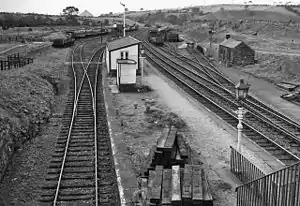Bullgill railway station | |
|---|---|
 Bullgill station | |
| General information | |
| Location | Bullgill, Cumberland England |
| Coordinates | 54°44′00″N 3°24′25″W / 54.7333°N 3.4070°W |
| Grid reference | NY095385 |
| Platforms | 3[1][2][3] |
| Other information | |
| Status | Disused |
| History | |
| Original company | Maryport & Carlisle Railway |
| Post-grouping | London Midland and Scottish Railway |
| Key dates | |
| 1840 | Opened |
| 7 March 1960 | Station closed to passengers[4] |
| 1964 | Station closed to goods |
Maryport and Carlisle Railway | |||||||||||||||||||||||||||||||||||||||||||||||||||||||||||||||||||||||||||||||||||||||||||||||||||||||||||||||||||||||||||||||||||||||||||||||||||||||||||||||||||||||||||||||||||||||||||||||||||||||||||||||||||||||||||||||||||||||||||||||||||||||
|---|---|---|---|---|---|---|---|---|---|---|---|---|---|---|---|---|---|---|---|---|---|---|---|---|---|---|---|---|---|---|---|---|---|---|---|---|---|---|---|---|---|---|---|---|---|---|---|---|---|---|---|---|---|---|---|---|---|---|---|---|---|---|---|---|---|---|---|---|---|---|---|---|---|---|---|---|---|---|---|---|---|---|---|---|---|---|---|---|---|---|---|---|---|---|---|---|---|---|---|---|---|---|---|---|---|---|---|---|---|---|---|---|---|---|---|---|---|---|---|---|---|---|---|---|---|---|---|---|---|---|---|---|---|---|---|---|---|---|---|---|---|---|---|---|---|---|---|---|---|---|---|---|---|---|---|---|---|---|---|---|---|---|---|---|---|---|---|---|---|---|---|---|---|---|---|---|---|---|---|---|---|---|---|---|---|---|---|---|---|---|---|---|---|---|---|---|---|---|---|---|---|---|---|---|---|---|---|---|---|---|---|---|---|---|---|---|---|---|---|---|---|---|---|---|---|---|---|---|---|---|---|---|---|---|---|---|---|---|---|---|---|---|---|---|---|---|---|
| |||||||||||||||||||||||||||||||||||||||||||||||||||||||||||||||||||||||||||||||||||||||||||||||||||||||||||||||||||||||||||||||||||||||||||||||||||||||||||||||||||||||||||||||||||||||||||||||||||||||||||||||||||||||||||||||||||||||||||||||||||||||
Bullgill or Bull Gill was a railway station on the Maryport and Carlisle Railway (M&CR) serving Bullgill in Cumbria. The station was opened by the M&CR in 1840 and lay in the Parish of Oughterside and Allerby. It closed in 1960[5]
History
Bullgill station was opened by the Maryport & Carlisle Railway (M&CR) in 1840.[5][6] At grouping in 1923 the M&CR became a part of the London, Midland and Scottish Railway. It was closed to passenger traffic by the British Transport Commission on 7 March 1960[7] and to all traffic four years later. Much of the station has since been demolished, but remnants of the southbound platform still survive and can be seen from passing trains.
The main Carlisle-Maryport line (completed in 1845) remains open and forms part of the Cumbrian Coast Line between Carlisle and Barrow in Furness. Prior to closure John Joseph Metcalfe was the Station Master.[8] In 2009 the local community recommended that the station should be re-opened.[9]
The station was also the junction for the M&CR's Derwent Branch to Brigham and Cockermouth, which opened in April 1867.[10][11] Though this line was built primarily to handle iron-ore traffic, it was also used by passenger services. These started from Maryport and ran north to Bullgill, where they reversed. They then continued south to Brigham, where another reversal was necessary before they ran onwards to their destination at Cockermouth.[12] The need for these reversals meant that the modest 12 miles (19 km) journey took 50 minutes to complete. This line was closed to passengers by the LMS on 29 April 1935 and subsequently dismantled.
References
- ↑ Images of the station, via Cumbria Railways Association
- ↑ Robinson 1985, p. 57.
- ↑ Joy 1973, p. 57.
- ↑ Quick 2009, p. 106.
- 1 2 Old Cumbria Gazetteer Retrieved : 2012-08-28
- ↑ English Heritage Retrieved : 2012-08-28
- ↑ Daniels, Gerald David; Dench, Leslie Alan (February 1963) [1962]. Passengers No More 1952–1962. Closures of stations and branch lines (PDF) (2nd ed.). Brighton: GLO. p. 9. OCLC 504319235.
- ↑ Bulgill Station Master Retrieved : 2012-09-02
- ↑ Bullgill re-opening Retrieved : 2012-09-02
- ↑ CRA - The Maryport & Carlisle Railway in 1921Cumbrian Railways Association; Retrieved 2013-10-17
- ↑ Jones 2020, pp. 288–301.
- ↑ Derwent Branch Retrieved : 2012-09-02
Sources
- Jones, Allan (October 2020). Peascod, Michael (ed.). "The Derwent Branch of the Maryport and Carlisle Railway". Cumbrian Railways. Pinner: Cumbrian Railways Association. 13 (8). ISSN 1466-6812.
- Joy, David (1973). Railways of the Lake Counties. Clapham, via Lancaster: Dalesman Publishing. ISBN 0-85206-200-1.
- Robinson, Peter W. (1985). Railways of Cumbria. Clapham, via Lancaster: Dalesman Books. ISBN 0-85206-815-8.
- Quick, Michael (2009) [2001]. Railway passenger stations in Great Britain: a chronology (4th ed.). Oxford: Railway & Canal Historical Society. ISBN 978-0-901461-57-5. OCLC 612226077.
Further reading
- Jowett, Alan (March 1989). Jowett's Railway Atlas of Great Britain and Ireland: From Pre-Grouping to the Present Day (1st ed.). Sparkford: Patrick Stephens Ltd. ISBN 978-1-85260-086-0. OCLC 22311137.
- Jowett, Alan (2000). Jowett's Nationalised Railway Atlas (1st ed.). Penryn, Cornwall: Atlantic Transport Publishers. ISBN 978-0-906899-99-1. OCLC 228266687.
External links
| Preceding station | Historical railways | Following station | ||
|---|---|---|---|---|
| Arkleby Station closed, line open |
Maryport & Carlisle Railway Main Line |
Dearham Bridge Station closed, line open | ||
| Disused railways | ||||
| Arkleby Line open, station closed |
Maryport and Carlisle Railway Derwent Branch |
Dearham Line and station closed | ||